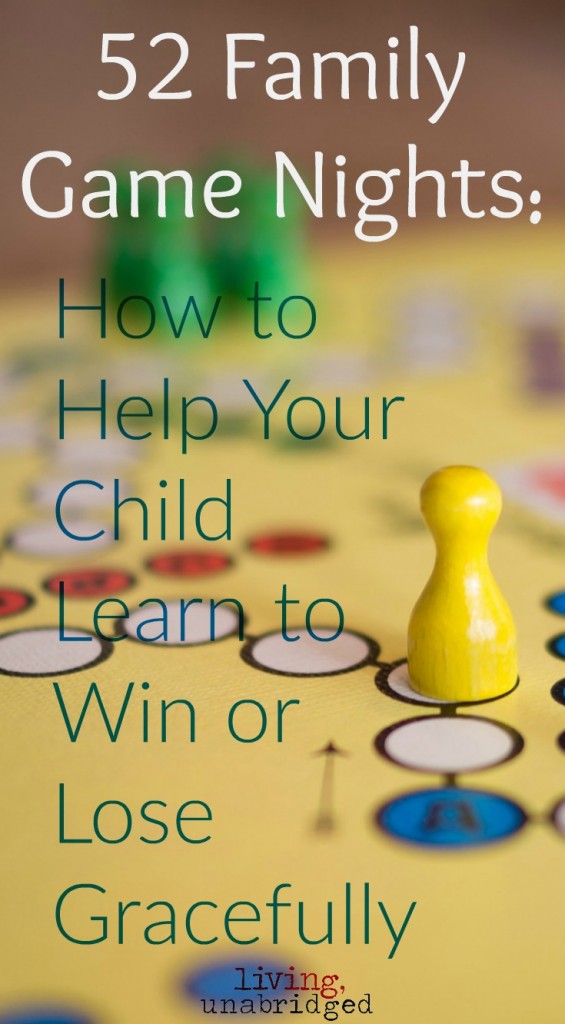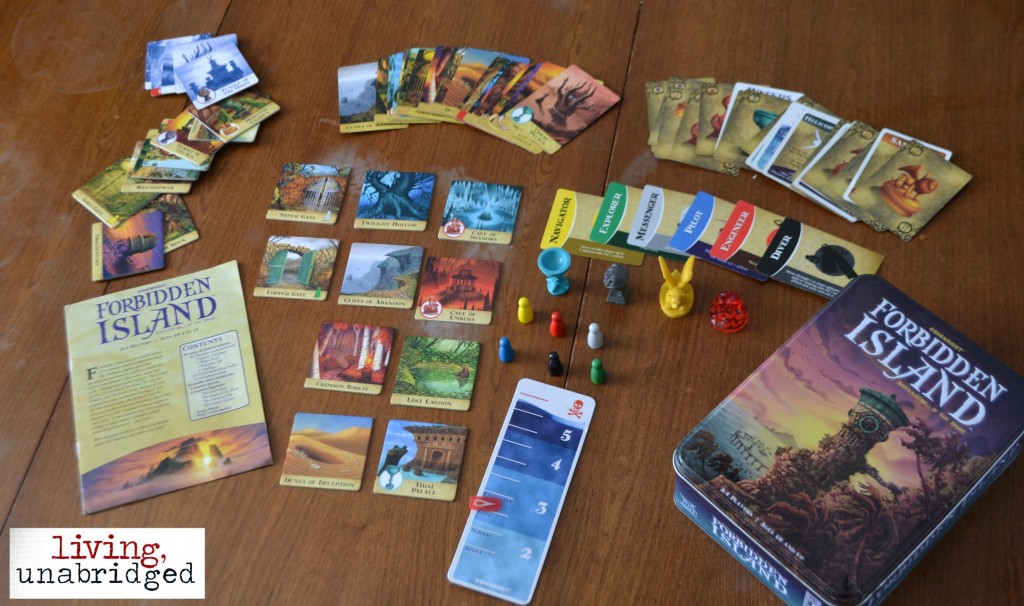
Welcome to Week #2 of our 52 week series on Family Game Nights. Last week, Anna asked a great question:
I’d be interested in any tips you might have to deal with a kid who gets very angry if they aren’t winning… Sadly, that’s a big problem with one of mine, and it ruins an otherwise fun time for the rest of us.
Maybe you can relate - I know we could.
So, read on for suggestions on how to deal with this situation and for this week's game.

How to deal with a child who gets angry when he / she isn't winning:
- Increase the frequency of game play. I know this sounds counter-intuitive. After all, you're miserable while playing so why subject yourself to more? But being able to tell a child, "We'll be playing another game next week," can help ease the pressure to win. It doesn't always work, of course, but when a child knows this isn't just a Thanksgiving / Christmas / New Year's Eve occurrence, he might relax his grip on winning.
- Continue to play even if your angry player quits or you have to excuse him from the table. We cannot allow the fit thrower to control everyone else. So maintain your cool, even if you are troubled, and continue to play with those who will. In our experience with this (primarily young school age children), the child will often calm down and come back. If this happens, allow him or her to pick up where he is. Do not make special allowances because he missed a turn. Do not comment. Just continue play. Don't take part in the power struggle and help the other players to have a good time. Deal with the anger issue with whatever consequences your family usually applies for this type of infraction. And, your mileage may vary on this, of course, but I wouldn't make a big deal about a kid who makes it through the game with only a few minor infractions. No external reward is necessary: the reward is playing the game.
- Be careful about "smack talk". Some good natured ribbing is part of game playing. But I strongly believe that this should not devolve into personal insults or "kidding, but not really kidding" statements. You know your child's heart (and if you don't, playing a game together is a good way to learn it!) and you can discern intent. When our five year old says, "I'm going to beat you - I'm going to win!" (even if she's losing), that's probably OK. But an older child calling people stupid is not. If a game is frustrating, encourage all players to "use your words". Calling a game dumb isn't profitable. But explaining, "I think too much is left to chance and that frustrates me," is a conversation you can have. (And no, I wouldn't expect a young child to say that, but I would expect an older child to attempt to articulate why they like or don't like something.) Don't allow a winner to brag, either. Feeling pleased is acceptable, being smug or boastful is not.
- Remember Your "Why". You should have a stock saying when someone starts melting down at game time. Something like, "We're not playing a game so that we can be the world's best Scrabble players. We're playing so we can enjoy our time together as a family." Sometimes adults need this reminder as much as the kids.
- Don't change the rules. I may not play cut-throat, but I also do not "let the kid win" even when they're young. Adapting a game ahead of time is a family decision, but changing the rules as you go along is provoking. You may wonder what the harm is in letting a small child win Candy Land or Snakes and Ladders or whatever. The problem is sometimes you lose, but you can always try again. A three year old can learn that.
- Work on this character issue at other, less stressful times. It usually doesn't help to ask a child, "Why do you do [whatever the character flaw is]?" She doesn't know. He doesn't know how to fix it. She's embarrassed. He may deny that it happens. My husband says that games help illuminate character issues and therefore help us to address those issues. He sees that as a strength, not a weakness, of playing games.
- Play a game where everyone wins or loses together. One way to ease the anger over winning or losing a game is to play a cooperative game. Which brings us to our suggestion for this week.
Family Game Night #2: Forbidden Island
Forbidden Islandis a cooperative game where players are adventurers on a mission to obtain four treasures on a slowly sinking island. If the players manage to find all four and escape the island via helicopter, they all win. If not, they all lose. This game is for 2-4 players (although it can be played solo) and takes about 45 minutes to play. It is recommended for ages 10 and up; however, we have successfully played the game with children as young as 5 or 6 due to its cooperative nature.
On each turn, a player may perform up to three actions. These include walking to a different tile, “shoring up” a tile that has been flooded, giving a treasure card to another player, and claiming a treasure by spending four matching treasure cards at the matching location. The player then draws two more cards. While most of the cards depict one of the four treasures, there are also a few special cards granting extra actions. There are also a few dreaded “Waters Rise” cards, causing the island to sink further into the sea. Players must ensure that no vital tiles (such as the Helicopter Landing Site) sink all the way under the water while quickly collecting the right sets and retrieving the treasures.
Forbidden Island is always a new challenge each time you play. The island is made up of a series of tiles that are arranged randomly each game. Each player takes on one of the six characters, each with a special ability—a way to break one of the game’s rules. Finally, the difficulty level can be set higher or lower depending on how hard you want the game to be. With stunning artwork, beautiful components, and a price of less than $20, our family highly recommends Forbidden Island. (This synopsis is from my husband.)
Summary of Forbidden Island:
Number of players: 2-4
Recommended Ages: 10 and up, or younger if used to playing games
Reading required? Yes, but minimal.
Do you have any tips for playing games with a sore loser? How do you teach a child to win or lose graciously?

I've started a new Pinterest Board for this series. I'll be adding our favorite games from this series, as well as games that our family would like to play in the future.
Follow Karen (Living Unabridged)'s board Family Game Nights on Pinterest.



